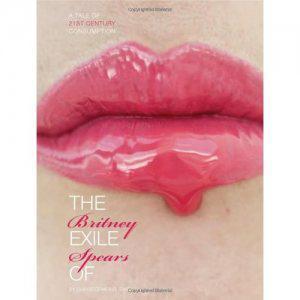The Exile of Britney Spears: A Tale of 21st Century Consumption
By Christopher R. Smit
Intellect Books, 2011
Reviewed by Cila Warncke

The Exile of Britney Spears is an important book because it is the first published attempt to examine the sociological and cultural implications of the world’s most famous pop star. Author Christopher Smit, a professor of media studies, rightly judges that there is more to the public’s fascination with Britney than simple curiosity about a successful singer. There are, after all, plenty of celebrities. Why does Britney command so much attention? Smit rather daringly argues that our (by which I mean the media-consuming public) appetite for Britney is the natural outcome of voracious consumer culture. His j’accuse is that, “The breaking of Britney Spears has been, is and will continue to be an act of collective behaviour… none of us is innocent.”
It’s an audacious start and I was rooting for Smit to sink his teeth in. There is no shortage of material to support the notion that Britney’s life is a parable of exploitation. From the predatory paparazzi profiled in Shooting Britney (The Atlantic, 2008), to her father who lives large on his daughter’s fortune, to the media that carps about everything from her relationship to her dance moves, it seems everyone wants a bite of Britney. Smit’s analysis, however, varies from insightful to superficial. On the one hand, he offers thoughtful comments on the role of the public in her creation, arguing that when she joined The Mickey Mouse Club she metamorphosed into a fantasy figure required to, “represent a certain type of childhood, one intermingled with cultural meaning and societal structures… a representation, a facsimile” (47). But then he doesn’t explain what she was asked to represent, or why it matters.
Each of the book’s fifteen chapters is a mini-essay on an aspect of Britney’s life or career, most of which have a tendency to wander. “Motherhood” begins with Partridge Family star Danny Bonaduce, touches on Brit’s appeal to gay men, discusses the anatomical effects of child bearing and ends with the mawkish speculation that when her sons, “saw Britney they saw mom. Something we could never do” (104). As parting shots go, that’s infuriatingly aimless. Exile’s other weakness is a factual sloppiness. Even though this isn’t a biography Smit should know her background. When, for example, he describes her parents as: “A quiet, hard-working father. A beautiful mother, blonde and at home taking care of the children” (39), despite the fact that dad, Jamie, was an intermittently employed alcoholic and Lynne was a school-teacher (see Lynne Spear’s book Through The Storm) is he being ironic or just uninformed?
Ultimately, The Exile of Britney Spears is more descriptive than analytical. The central argument that the public is culpable in the rise and fall of Britney seems self-evident. What makes the book unsatisfying is that Smit never tackles the why. What is it about 21st century consumer culture that compels us to chew up and spit out a naïve, half-educated Mickey Mouse Club star from the depths of Louisiana? Smit correctly diagnosis a cultural disease but leaves its pathology unexamined.
